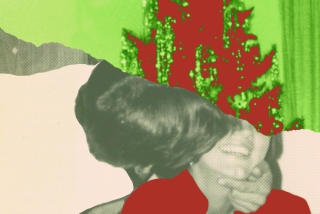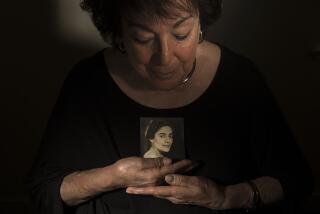Necessary Losses by Judith Viorst (Simon & Schuster: $17.95; 440 pp.)
- Share via
Life is a balance sheet in which the losses we suffer along the way are offset by what they contribute to our development as independent, responsible, connected people. So argues Judith Viorst in “Necessary Losses.” Her prescription for turning life’s inevitable losses into gains is a familiar one, especially for devotees of pop psychology: Relinquish your unrealistic dreams and expectations, separate gracefully when the time is ripe from those you love, and as you grow older, let go of your younger self.
But though we’ve heard the message before, Viorst’s probing and sensitive treatment of the subject lifts it several notches above those cheery self-help books with titles like “How to Win by Losing” or “The Joy of Loss.” We are not offered here the soothing syrup of the relentlessly upbeat treatise which promises instant success in our sexual and financial affairs if we follow a few simple rules and nostrums. Rather, we are given fair warning that the cost/benefit equation of the maturing process is complex and often painful: “ . . . our losses and gains are inextricably mixed. There is plenty we have to give up in order to grow. For we cannot love anything without becoming vulnerable to loss.”
Viorst, who writes a regular column for Redbook, has studied at the Freudian-based Washington Psychoanalytic Institute, so it is not surprising that her argument is weighted heavily in favor of the indelible imprint of the early years on later development. The Oedipus complex, infant sexuality, sibling rivalry--the classic Freudian view of human development--is served up along with a seasoning of Erikson, Mahler, Winnicott, Bowlby and other developmental psychologists.
In obeisance to the Freudian perspective, the author identifies as the Ultimate Loss the separation of child from mother. The severing of the umbilical connection is like the biblical expulsion from Paradise: Never again will we experience such blissful oneness. “Our lifelong yearning for union originates in our lifelong yearning to return--if not to the womb, then to the state of illusory union called symbiosis.”
The physical merging of sex, the desire for connection with the natural world and for a mystical union with a transcendent Being--these universal human longings are seen as expressions of our yearning to experience once again our original oneness with the nurturing mother. So devastating is Motherloss, according to the school of psychoanalysis with which Viorst identifies, that even a bad, witchy mother is better than none. Item: A small boy lies in a hospital, frightened and in pain, with burns covering 40% of his body. “Someone has doused him with alcohol and then, unimaginably, has set him on fire. He cries for his mother. His mother has set him on fire.”
But Motherloss is only the beginning. Other inescapable losses await us as we move through the aging process--through those “seven ages” that Shakespeare has allotted to us during which we play our many parts. We will have to share our parents’ love with siblings, learn to live with guilt, put away our childish dreams and fantasies, discover that our friends are flawed, that romance is not as romantic, or sex as sexy as we’d been led to believe, that marriage doesn’t live up to our expectations, that our children leave us and that finally, if we survive our mid-life crisis, we are faced with the ultimate deprivation--we grow old and become, in the words of Yeats, “a paltry thing, a tattered coat upon a stick.”
How do we cope with these losses, these separations from all that we hold dear and worth living for? Unfortunately, as is the case with many human ills and problems, the diagnosis is easier to come by than the cure. Viorst has little more to offer us than--self knowledge and the understanding that “losing is the price we pay for living. It is also the source of much of our growth and gain.” Which, again, brings us back to Freud and his statement: “One should not try to eradicate one’s complexes, but come to terms with them; they are the legitimate guiding forces of one’s behavior in the world.”
And so, readers who have been conditioned by certain “how to” books to expect a simple problem-solving formula may feel they have been let down. But from this critic’s perspective, the chief drawback of “Necessary Losses” is its lack of a social context. The separations and connections in marriage, in families, in mid-life and old age do not occur in a cultural vacuum. For example, the extended family, which is still the norm in agrarian cultures, does not experience the generational and other intra-familial disconnections which are so prevalent in our industrialized, urbanized society. The author’s persistent emphasis on intra-psychic forces seems misplaced in an age when there is increasing recognition of the impact upon individual development of social, technological and cultural influences.
But there is much of value in this book--in Viorst’s respect for the individual, in her emphatic detailing of the ways in which various people deal with the necessary losses in their lives, in her often poignant sketches of her own family relationships, and, though it may leave some readers unsatisfied, in her faith that self-understanding is better than self-delusion.
More to Read
Sign up for our Book Club newsletter
Get the latest news, events and more from the Los Angeles Times Book Club, and help us get L.A. reading and talking.
You may occasionally receive promotional content from the Los Angeles Times.










